Why Self-Care is Non-Negotiable for Teacher Skills
Teaching is one of the most demanding professions, requiring constant emotional labor, adaptability, and patience. According to the American Psychological Association, nearly half of all teachers report high daily stress during the school year—matching rates of nurses and physicians. This chronic stress directly impacts your teacher skills, from classroom management to creative lesson planning.
Self-Care isn’t selfish—it’s essential maintenance for your most important teaching tool: yourself. When you prioritize your wellbeing, you’re actually investing in your professional capabilities. Research shows that teachers who practice regular self-care demonstrate greater resilience, improved classroom management, and stronger connections with students. These enhanced teacher skills translate to better student outcomes, creating a positive cycle that benefits everyone in the educational ecosystem.
The reality is that teacher skills deteriorate under chronic stress. Your ability to respond thoughtfully rather than reactively, to generate creative solutions, and to maintain the emotional bandwidth needed for student support all depend on your wellbeing. Self-care practices help replenish your emotional reserves, sharpen your cognitive functions, and maintain the energy needed to be fully present for your students.
“Self-care is not a luxury for teachers—it’s a professional responsibility. Your students deserve the best version of you, and that requires intentional self-maintenance.”
Many educators feel guilty about prioritizing their own needs, viewing self-care as time taken away from preparation or student support. However, this perspective fails to recognize that teacher skills are directly enhanced through proper self-care. Just as you would maintain essential classroom equipment, your professional effectiveness requires regular maintenance through intentional self-care practices.
Assessing Your Current Self-Care Practices
Before developing a comprehensive Self-Care plan, it’s important to honestly evaluate your current practices. This assessment helps identify areas where you’re already succeeding and where you might need additional support. Understanding your self-care baseline is a fundamental teacher skill that supports professional growth.
Rate your current practices (1-5 scale):
- I prioritize getting 7-8 hours of sleep most nights
- I maintain regular physical activity
- I eat nutritious meals throughout the day
- I stay hydrated during school hours
- I take bathroom breaks when needed (surprisingly challenging for teachers!)
- I attend regular preventative healthcare appointments
Rate your current practices (1-5 scale):
- I have healthy ways to process difficult emotions
- I set appropriate boundaries with students and parents
- I engage in activities that bring me joy regularly
- I practice self-compassion when I make mistakes
- I connect with supportive colleagues or friends
- I recognize and celebrate my teaching accomplishments
Rate your current practices (1-5 scale):
- I set realistic expectations for what I can accomplish
- I take short breaks during the school day when possible
- I have strategies to manage my workload effectively
- I continue developing my teacher skills through manageable professional development
- I leave work at work at least some days of the week
- I have methods for managing classroom stress in the moment
After completing this assessment, identify areas scoring 3 or below as potential focus points for your self-care plan. Remember that developing teacher skills includes learning to recognize your own needs and limitations. Your self-awareness in this process is itself a valuable professional attribute that will serve both you and your students.
Ready to Take Your Self-Care to the Next Level?
Discover specialized self-care resources designed specifically for educators at Credits for Teachers. Our research-backed approaches help you develop sustainable practices that enhance your teacher skills and classroom effectiveness.
Physical Self-Care: Foundation for Effective Teaching

Physical wellbeing forms the foundation upon which all your teacher skills are built. When your body is properly cared for, your energy, focus, and emotional regulation all improve. Here are practical physical self-care strategies specifically designed for the unique challenges of teaching:
Hydration Strategies for Classroom Teachers
Many teachers unintentionally dehydrate themselves by limiting fluid intake to avoid bathroom breaks. This impacts cognitive function, energy levels, and even voice quality—all essential teacher skills. Try these classroom-friendly hydration approaches:
- Invest in a large, insulated water bottle with time markers
- Set up a hydration system with your teaching neighbor for bathroom break coverage
- Establish classroom procedures that allow you to step out briefly when needed
- Front-load hydration before school and rehydrate during planning periods
Teacher-Friendly Nutrition Approaches
The erratic eating schedule of teachers (20-minute lunches often interrupted by student needs) can wreak havoc on your energy and mood. Stabilizing your nutrition supports crucial teacher skills like patience and consistent energy:
- Prepare grab-and-go breakfast options for busy mornings
- Pack protein-rich snacks in desk drawers for energy dips
- Use weekend meal prep to ensure nutritious lunches all week
- Establish a “sacred lunch” policy one day per week where you eat somewhere other than your classroom
Movement for Educators
Though teaching keeps you on your feet, it’s often not the kind of movement that rejuvenates your body. Intentional physical activity enhances cognitive function and stress management—key teacher skills for classroom success:
- Incorporate movement breaks with your students (benefits everyone!)
- Use a standing desk option for grading or prep work
- Take the long route to the office, restroom, or teacher workroom
- Schedule short walks during prep periods when possible
- Find exercise options that fit teacher schedules (early morning, weekend, or streaming workouts)
Sleep Hygiene for Teachers
Quality sleep directly impacts your patience, creativity, and problem-solving abilities—all critical teacher skills. The challenge is breaking the cycle of late-night grading and early morning prep:
- Establish a firm “grading curfew” after which you switch to non-work activities
- Create a calming bedtime routine that signals to your body it’s time to wind down
- Limit screen time in the hour before bed (especially work email!)
- Use weekend power naps to help recover from weekday sleep deficits
Physical self-care might seem basic, but it’s often the first area teachers sacrifice when pressed for time. Recognizing that your physical wellbeing directly impacts your teacher skills can help prioritize these fundamental practices.
Emotional Self-Care: Sustaining Your Teaching Heart
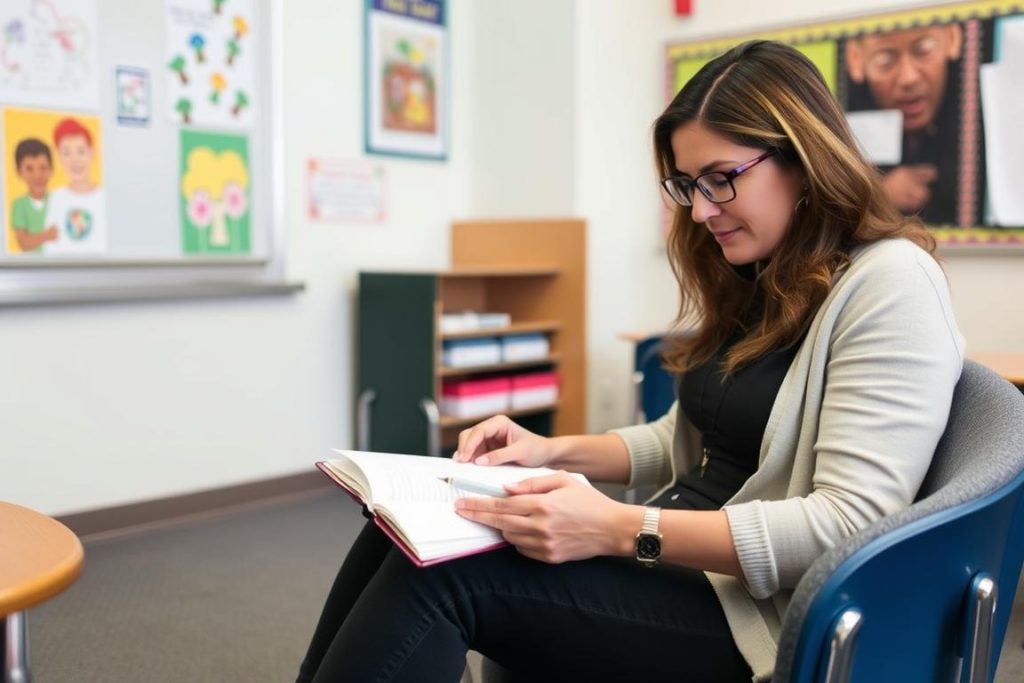
Teaching is profoundly emotional work. You celebrate student breakthroughs, navigate classroom conflicts, manage parent concerns, and process systemic challenges—often all before lunch. Emotional self-care isn’t a luxury; it’s essential for maintaining the emotional intelligence that’s central to effective teacher skills.
Boundary Setting as Self-Care
Clear boundaries protect your emotional wellbeing and actually improve your teacher skills by preventing burnout. Consider implementing these boundary practices:
- Establish communication windows (when you’ll respond to emails/messages)
- Create physical boundaries (times when your classroom is your private space)
- Develop emotional boundaries (ways to care deeply without carrying every student problem home)
- Practice saying “I need to think about that” instead of immediate agreement to new requests
Processing Teaching Emotions
The emotional labor of teaching requires intentional processing. These practices help manage the emotional weight while strengthening reflective teacher skills:
- Maintain a teaching journal for processing difficult interactions
- Establish a “decompression ritual” between school and home
- Find a trusted colleague for mutual support (not just venting)
- Practice naming emotions specifically rather than generally feeling “stressed”
“Teaching requires emotional presence, but carrying every classroom challenge home leads to burnout. Developing emotional boundaries isn’t about caring less—it’s about sustaining your capacity to care over a long career.”
Joy Practices for Educators
Intentionally cultivating joy strengthens resilience and enhances creative teacher skills. Consider these teacher-friendly approaches:
- Keep a “wins” journal documenting positive teaching moments
- Schedule activities that bring you joy with the same commitment as work obligations
- Create a “joy emergency kit” in your desk with items that lift your spirits
- Intentionally notice and savor small positive moments throughout the school day
Emotional self-care directly translates to enhanced teacher skills in relationship building, classroom climate creation, and conflict resolution. By maintaining your emotional wellbeing, you model healthy emotional regulation for your students while preserving your capacity to teach with heart year after year.
Enhance Your Emotional Resilience
Discover specialized techniques for managing the unique emotional challenges of teaching. Credits for Teachers offers professional development opportunities that count toward your continuing education requirements while supporting your wellbeing.
Cognitive Self-Care: Maintaining Your Teaching Mind

The cognitive demands of teaching are intense—from managing multiple learning needs to adapting lessons in real-time, your brain is constantly problem-solving. Cognitive self-care practices help maintain mental clarity and prevent decision fatigue, directly enhancing your teacher skills.
Mental Breaks for Educators
Strategic mental breaks refresh cognitive function and improve teacher skills like adaptability and creative problem-solving:
- Implement the “Pomodoro technique” during grading or planning (25 minutes of focus followed by a 5-minute break)
- Practice 30-second mindfulness moments between classes
- Alternate cognitively demanding tasks with simpler ones
- Schedule short walks to reset your thinking during prep periods
Cognitive Stimulation Beyond Teaching
Engaging your mind outside of education prevents cognitive narrowing and enhances teacher skills through fresh perspectives:
- Read books unrelated to education
- Pursue hobbies that challenge different thinking patterns
- Engage in conversations outside the education sphere
- Learn something new that has nothing to do with teaching
Decision Fatigue Management
Teachers make hundreds of decisions daily, depleting cognitive resources. These strategies preserve mental energy for when it matters most:
- Create decision frameworks for common classroom situations
- Establish routines that reduce daily decisions (meal planning, outfit selection)
- Schedule important decisions during your peak mental energy times
- Use templates for recurring tasks like parent communications or feedback
Cognitive self-care directly impacts your instructional effectiveness and problem-solving capabilities. By protecting and refreshing your mental resources, you enhance the teacher skills that depend on clear thinking and creative approaches.
Time Management as Self-Care: Creating Space for Wellbeing
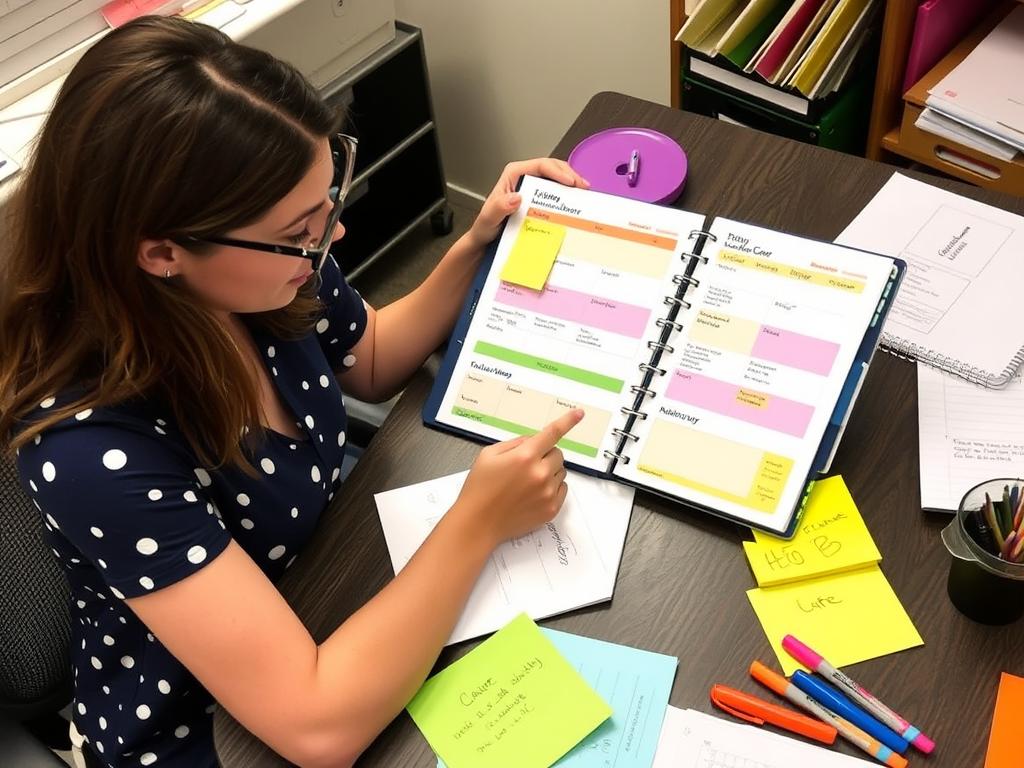
For many educators, the biggest barrier to Self-Care is the perception of not having enough time. Effective time management is itself a form of self-care and a critical teacher skill that creates space for other wellbeing practices. The goal isn’t to cram more into your day, but to align your time with your priorities—including your wellbeing.
Teacher-Specific Time Management Strategies
These approaches address the unique time challenges educators face:
- Use the “touch it once” principle for paperwork and emails
- Implement batch processing for similar tasks (grading, emails, planning)
- Establish firm start and end times for work at least three days per week
- Create templates for recurring tasks like feedback or communications
- Schedule self-care activities with the same commitment as work obligations
The Power of Strategic Incompletion
Perfectionism is a common teacher trait that can undermine self-care. Learning strategic incompletion is a valuable teacher skill:
- Identify tasks where “good enough” truly is sufficient
- Practice the 80/20 rule (focus on the 20% of work that creates 80% of impact)
- Recognize when diminishing returns set in on lesson preparation
- Use student self-assessment and peer feedback to reduce grading load
“The most important teacher skill might be knowing when to stop—recognizing the point where additional effort yields minimal returns while consuming time needed for renewal.”
Creating Micro-Moments for Self-Care
Even in the busiest teaching schedule, tiny self-care moments can be integrated:
- Practice three deep breaths before greeting each class
- Use transitions between activities for 30-second stretching
- Keep a gratitude journal at your desk for quick entries
- Transform routine tasks (walking to the office, making copies) into mindfulness opportunities
Effective time management doesn’t just create space for self-care—it is self-care. By approaching your schedule with intention and protecting time for renewal, you develop teacher skills that support sustainable excellence rather than exhausting sprints followed by burnout.
Creating Your Personalized Self-Care Plan

Now that we’ve explored various dimensions of Self-Care, it’s time to create your personalized plan. Effective self-care planning is itself an important teacher skill that supports professional sustainability. The most effective plans are realistic, flexible, and aligned with your specific needs and circumstances.
Step 1: Identify Your Self-Care Priorities
Based on your self-assessment, identify 2-3 areas where improved self-care would most impact your wellbeing and teacher skills:
- Where do you feel the greatest deficit currently?
- Which area, if improved, would have the most positive ripple effects?
- What self-care practices align with your current life circumstances and resources?
- Which teacher skills would benefit most from enhanced self-care?
Step 2: Design Realistic Practices
For each priority area, develop specific practices that meet these criteria:
- Requires minimal startup effort or resources
- Can be integrated into existing routines
- Provides meaningful benefit within your current constraints
- Addresses specific teacher challenges you face
Step 3: Create Implementation Triggers
Link new self-care practices to existing habits or routines:
- “After I take attendance, I will take three deep breaths”
- “Before checking email, I will drink a full glass of water”
- “When I arrive home, I will change clothes as a transition ritual”
- “After Friday’s last class, I will write down three teaching wins from the week”
Step 4: Establish Accountability and Support
Create structures that support consistent practice:
- Share your self-care goals with a trusted colleague or friend
- Schedule check-ins to review and adjust your plan
- Use visual reminders in your planning materials or classroom
- Join or create a teacher wellbeing group for mutual support
Self-Care Plan Template
Priority Area: [Physical, Emotional, Cognitive, Social, etc.]
Current Challenge: [Specific issue you’re facing]
Self-Care Practice: [Specific action you’ll take]
Implementation Trigger: [When/where you’ll practice this]
Resources Needed: [What you need to make this happen]
Potential Obstacles: [What might get in the way]
Solutions to Obstacles: [How you’ll address barriers]
Success Measurement: [How you’ll know it’s working]
Remember that self-care planning is an ongoing process, not a one-time event. As your teaching circumstances change throughout the year, your self-care needs will evolve as well. The ability to adapt your self-care approach is itself a valuable teacher skill that supports career longevity.
Overcoming Common Self-Care Barriers for Teachers
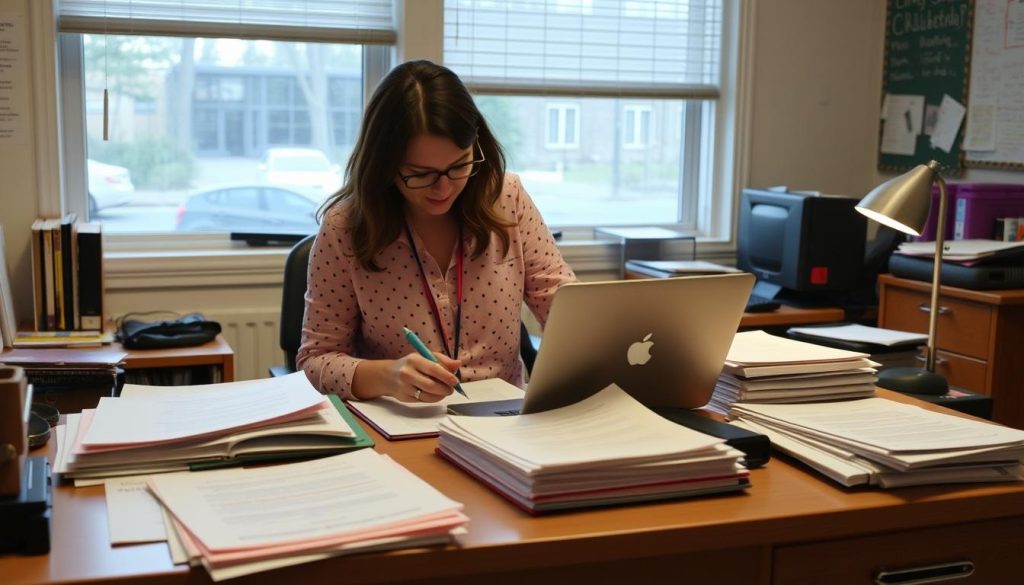
Even with the best intentions, teachers face unique barriers to consistent Self-Care. Recognizing and proactively addressing these obstacles is an essential teacher skill that supports sustainable wellbeing practices.
The Guilt Barrier
Many teachers feel selfish prioritizing their own needs when students have so many unmet needs. To overcome this:
- Reframe self-care as a professional responsibility that enhances teacher skills
- Recognize that modeling healthy boundaries teaches students important life skills
- Remember that your sustainable wellbeing serves students better than your burnout
- Practice self-compassion statements that counter guilt narratives
The Time Barrier
The perpetual challenge of “not enough hours” requires strategic approaches:
- Start with micro-practices that take less than 2 minutes
- Integrate self-care into existing routines rather than adding new activities
- Identify and eliminate low-value tasks that consume time
- Practice saying “no” or “not now” to preserve time for essentials
The Perfectionism Barrier
The “all-or-nothing” mindset can undermine consistent self-care:
- Embrace “good enough” self-care rather than perfect implementation
- Recognize that imperfect self-care is infinitely better than none
- Start with one small, sustainable practice rather than a complete overhaul
- Focus on progress rather than perfection in your self-care journey
The School Culture Barrier
Some school environments implicitly or explicitly discourage self-care:
- Find like-minded colleagues to create a micro-culture of wellbeing
- Practice stealth self-care that doesn’t require public explanation
- Advocate for structural changes that support teacher wellbeing
- Share research on how teacher self-care improves student outcomes
Overcoming these barriers requires both practical strategies and mindset shifts. By recognizing the legitimate challenges to teacher self-care while developing specific approaches to address them, you build resilience and sustainability—essential teacher skills for a fulfilling career.
Integrating Self-Care into Classroom Culture
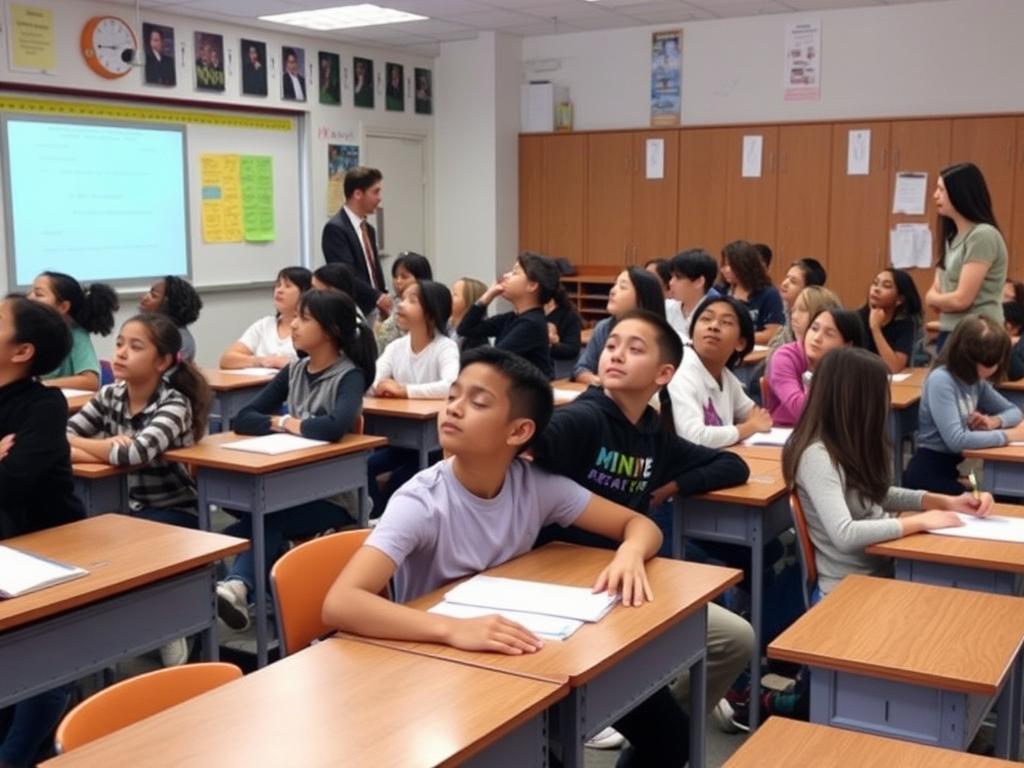
One powerful way to sustain your own Self-Care is to integrate wellbeing practices into your classroom culture. This approach serves multiple purposes: it makes self-care more accessible for you, models healthy habits for students, and creates a more regulated learning environment. These integrated practices enhance both student outcomes and teacher skills.
Co-Regulation Practices
These shared wellbeing activities benefit both you and your students:
- Begin class with 30 seconds of deep breathing or simple stretching
- Implement brief mindfulness moments during transitions
- Create a “reset corner” in your classroom that both you and students can use
- Integrate movement breaks that give everyone’s bodies and brains a refresh
Environmental Self-Care
Classroom environment modifications that support wellbeing:
- Adjust lighting to reduce eye strain and headaches
- Create a small teacher space that brings you joy
- Incorporate plants or natural elements that improve air quality and mood
- Reduce visual clutter that creates cognitive load
Teaching Self-Care as Content
Explicitly incorporating wellbeing into curriculum benefits everyone:
- Teach age-appropriate self-regulation strategies as part of social-emotional learning
- Discuss the science of stress and wellbeing in relevant subject areas
- Create projects that explore healthy habits and stress management
- Share appropriate aspects of your own self-care journey as teachable moments
“When we integrate self-care into our classroom culture, we create a powerful win-win: students develop essential life skills while we create an environment that supports our own wellbeing.”
By weaving self-care into your classroom practices, you create sustainability for yourself while developing important teacher skills in creating regulated learning environments. This integrated approach recognizes that teacher wellbeing and student wellbeing are deeply interconnected.
Self-Care During Educational Crisis Periods

The educational landscape regularly faces periods of intensified stress—whether from standardized testing seasons, pandemic disruptions, school tragedies, or major transitions. During these crisis periods, Self-Care becomes even more crucial yet often feels impossible. Developing crisis self-care strategies is an essential teacher skill for maintaining functionality during challenging times.
Triage Self-Care
When time and resources are severely limited, focus on high-impact basics:
- Prioritize sleep above almost everything else
- Maintain minimal but consistent hydration and nutrition
- Implement 30-second grounding practices between classes
- Identify one non-negotiable daily self-care practice and protect it fiercely
Boundary Intensification
Crisis periods require stronger protective measures:
- Temporarily reduce additional commitments
- Communicate clear capacity limits to stakeholders
- Implement stricter work/home separation practices
- Use email autoresponders to manage expectations
Collective Care Approaches
During crises, mutual support becomes essential:
- Create resource-sharing systems with colleagues
- Implement buddy check-ins for emotional support
- Organize rotation systems for high-demand tasks
- Advocate collectively for necessary supports
Crisis self-care isn’t about maintaining optimal wellbeing—it’s about preventing breakdown and supporting basic functionality during extremely challenging periods. The ability to adjust your self-care approach during crisis periods is a sophisticated teacher skill that supports resilience and recovery.
Develop Self-Care Skills
Access specialized resources for maintaining wellbeing during high-stress educational periods. Credits for Teachers offers practical strategies that enhance your teacher skills while supporting your resilience during challenging times.
Measuring the Impact of Your Self-Care Practices
How do you know if your Self-Care plan is actually working? Assessing the impact of your wellbeing practices helps refine your approach and provides motivation to continue. This reflective assessment is itself an important teacher skill that supports professional growth.
Wellbeing Indicators
Look for changes in these areas as evidence of effective self-care:
- Energy levels throughout the teaching day
- Sleep quality and morning mood
- Emotional regulation during challenging interactions
- Recovery time after difficult days
- Presence of joy and engagement in teaching
Professional Impact Markers
Effective self-care often improves these teacher skills and outcomes:
- Classroom management effectiveness
- Instructional creativity and flexibility
- Quality of student and colleague relationships
- Efficiency in planning and assessment
- Professional growth engagement
Simple Tracking Methods
Lightweight approaches to monitoring your self-care impact:
- Weekly wellbeing check-in using a 1-10 scale for key areas
- Monthly reflection on changes in specific teacher skills
- Journaling about the connection between self-care and teaching effectiveness
- Feedback from trusted colleagues on observed changes
Measuring the impact of your self-care practices provides valuable data for refining your approach. By tracking both wellbeing indicators and professional outcomes, you can identify the specific practices that most effectively enhance your teacher skills and quality of life.
Sustaining Self-Care Practices Throughout Your Teaching Career
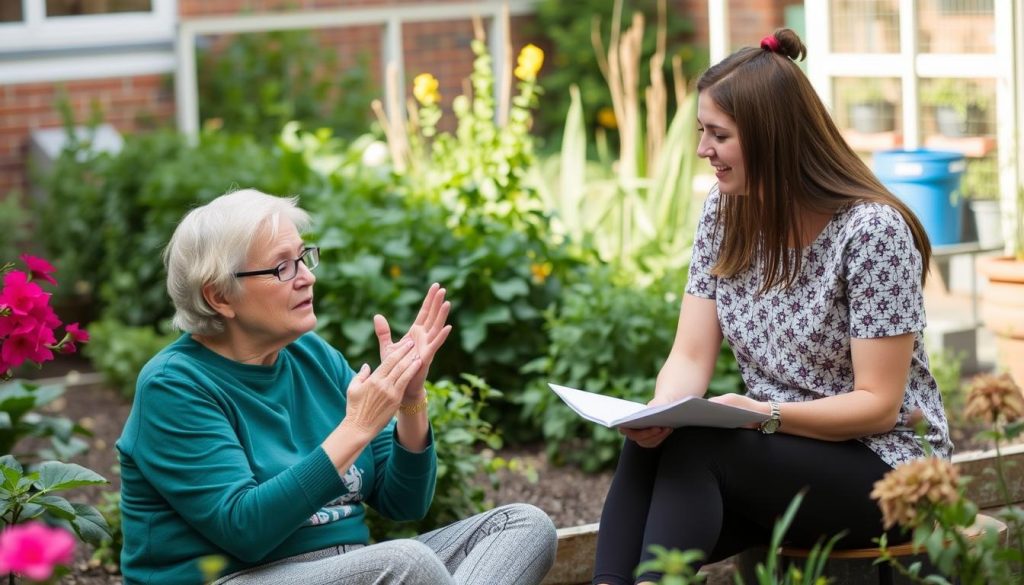
Self-Care isn’t a one-time fix but an ongoing practice that evolves throughout your teaching career. Developing sustainable approaches is a sophisticated teacher skill that supports career longevity and continued effectiveness. Here’s how to build self-care practices that last:
Seasonal Self-Care Adjustments
Recognize that different phases of the school year require different approaches:
- Create specific self-care plans for high-intensity periods (beginning of year, testing season)
- Take advantage of natural breaks for deeper renewal
- Adjust practices based on changing energy levels throughout the year
- Develop transition rituals between school seasons
Career Stage Adaptations
Self-care needs evolve as your teacher skills and career progress:
- Early career: Focus on basic sustainability and boundary-setting
- Mid-career: Address potential burnout and renew professional purpose
- Veteran status: Maintain physical wellbeing and cultivate mentorship opportunities
Building a Self-Care Community
Sustainable practices often require collective support:
- Create or join teacher wellbeing groups
- Advocate for structural changes that support teacher self-care
- Mentor newer teachers in sustainable practices
- Share resources and strategies with colleagues
The most sustainable self-care approaches are those that adapt to your changing needs while remaining anchored in core wellbeing principles. By viewing self-care as an evolving practice rather than a fixed solution, you develop the flexibility and resilience that characterize master teacher skills.
“The teachers who sustain long, impactful careers aren’t necessarily those with the strongest content knowledge or instructional techniques—they’re often those who mastered the art of sustainable self-care while continuously developing their teacher skills.”
Conclusion: Your Self-Care Journey Begins Now
Developing a sustainable Self-Care plan is one of the most important investments you can make in your teaching career. By prioritizing your wellbeing, you enhance your teacher skills, improve student outcomes, and create the foundation for a fulfilling professional journey.
Remember that self-care isn’t selfish—it’s an essential professional responsibility. The students in your classroom deserve a teacher who is regulated, energized, and emotionally available. Your colleagues benefit from your sustainable presence. And most importantly, you deserve to experience teaching as a rewarding vocation rather than a depleting obligation.
Start small, be consistent, and approach your self-care journey with the same compassion you show your students. Celebrate small wins, adjust when needed, and remember that developing effective self-care practices is itself an important teacher skill that grows with practice.
Your self-care journey begins with a single step—perhaps one of the practices from this article. Which one will you implement today?
Ready to Prioritize Your Wellbeing?
Discover comprehensive resources designed specifically for K12 teachers at Credits for Teachers. Our research-backed approaches help you develop sustainable self-care practices that enhance your teacher skills and classroom effectiveness.





Social Self-Care: Nurturing Supportive Connections
Teaching can be paradoxically isolating despite being surrounded by people all day. The nature of classroom teaching often means limited adult interaction and few opportunities for authentic connection during work hours. Intentional social self-care nurtures the relationships that provide support, perspective, and joy—enhancing both wellbeing and teacher skills.
Cultivating Supportive Colleague Relationships
Strategic professional connections can transform your teaching experience:
Maintaining Non-Teaching Relationships
Connections outside education provide valuable perspective and identity reinforcement:
Digital Connection Management
Online teacher communities can provide support but require intentional management:
Social connections directly impact your resilience and perspective as an educator. By nurturing relationships that support your wellbeing, you enhance teacher skills like empathy, communication, and collaborative problem-solving while creating a support network that sustains you through challenges.
Develop Self-Care Strategies with Like-Minded Educators
Join a community of teachers committed to both excellence and wellbeing. Credits for Teachers offers both resources and connection opportunities that enhance your teacher skills while supporting your self-care journey.
Explore Self-Care Resources